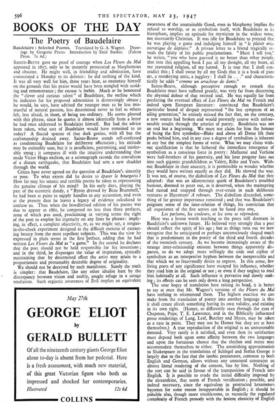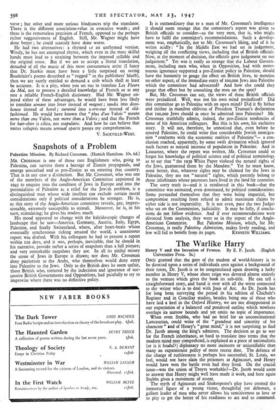BOOKS OF THE DAY
The Poetry of Baudelaire
SAINTE-BEUVE gave no proof of courage when Les Fleurs du Mal appeared in 1857, only to be instantly prosecuted as blasphemous and obscene. He might well, in friendship and admiration, have consecrated a Monday to its defence: he did nothing of the kind. It was all very well for him, three years later, to exonerate himself on the grounds that his praise would have been mingled with scold- ing and remonstrance ; the excuse is feeble. Much as he honoured the " clever and curious talent " of Baudelaire the outline which he indicates for his proposed admonition is distressingly obtuse; he would, he says, have advised the younger man to be less mis- trustful of natural passion, less determined never to feel as others felt, less afraid, in short, of being too ordinary. He seems pleased with this phrase, since he quotes it almost identically from a letter he had once addressed to Baudelaire himself. But had the advice been taken, what sort of Baudelaire would have remained to us today? A flaccid spectre of that dark genius, with all but the craftsmanship drained away. Sainte-Beuve stands self-confessed as condemning Baudelaire for deliberate affectation ; his attitude may be estimably sane, but it is insufficient, patronising, and intoler- ably smug ; it compares ill with the intuitive understanding that made Victor Hugo exclaim, as a seismograph records the convulsion of a distant earthquake, that Baudelaire had sent a new shudder through the world. Critics have never agreed on the question of Baudelaire's sincerity or pose. To what extent did he desire to epater le bourgeois ? How far may his satanic and terrible poems be taken as representing the genuine climate of his mind? In his early days, playing the part of the eccentric dandy, a "Byron dressed by Beau Brummell," he had been at pains to supply handles to any accusation, and even at the present date he leaves a legacy of evidence calculated to confuse us. Thus when the bowdlerised edition of his poems was due to appear in 1861, he composed no less than three prefaces, none of which was used, proclaiming in varying terms the right of the poet to employ his ingenuity on any lines he pleases: imply- ing, in effect, a complete objectivity, or, as we might say, a tongue- in-the-cheek experiment designed as the difficult exercise of extract- ing beauty from the most repellent subjects. This was the view he expressed in plain terms in the first preface, adding that he had written Les Fleurs du Mal as " a game." In the second he declares that the poet should not be held responsible for his inventions ; and in the third,_he disparages the value of inspiration, cynically maintaining that by determined effort the artist may attain to a proportionate and presumably desirable degree of originality. We should not be deceived by such manifestos. Surely the truth is simpler: that Baudelaire, like any other idealist hurt by the discrepancy between vision and reality, sought refuge in a savage retaliation. Such orgiastic awareness of Evil implies an equivalent awareness of the unattainable Good, even as blasphemy implies the refusal to worship, or as symbolism itself, with Baudelaire as its hierophant, implies an aptitude for mysticism in the widest sense, not necessarily Christian. It was idle for Baudelaire to pretend that he was playing a game and indulging himself in "/e plaisir aris- tocratique de diplaire." A private letter to a friend tragically re- veals the falsity of his public proclamations. " Must I tell you," he writes, "you who have guessed it no better than other people, that into this appalling book I put all my thought, all my heart, all my travestied religion, all my hatred. It is true that I shall con- tradict this ; I shall swear by all my Gods that it is a book of pure art, a monkeying antic, a jugglery: I shall lie . . ." and characteris- tically he adds "comme un arracheur de dents."
Sainte-Beuve, although perceptive enough to remark that Baudelaire must have suffered greatly, was very far from discerning the abysmal dolour of that twisted soul. He was equally far from predicting the eventual effect of Les Fleurs du Mal on French and indeed upon European literature : convinced that Baudelaire's particular brand of despair represented " the last symptom of an ailing generation," he entirely missed the fact that, on the contrary, a new source had broken and would presently course with unfore- seeable results through the arteries of poetry. Baudelaire was not an end but a beginning. We must not claim for him the honour of being the first symbolist—Blake and above all Dante lift their peaks behind him, and in any case a degree of symbolism is inherent in any but the simplest forms of verse. What we may claim with- out qualification is that he fathered the immediate emergence of symbolism as a conscious force in poetry: Mallarme and Verlaine were half-brothers of his paternity, and his later progeny fans out into such gigantic grandchildren as Valery, Rilke and Yeats. With- out Baudelaire in their ancestry, it is permissible to wonder whether they would have written exactly as they did. He showed the way. It was not, of course, the diabolism of Les Fleurs du Mal that they adopted: that was an idiosyncratic quirk of Baudelaire's troubled humour, doomed to peter out, as it deserved, when the mainspring had rusted and snapped through over-strain in such deliberate ventures as Huysmans' A rebours. The diabolism discarded, some- thing of far greater importance remained; and that was Baudelaire's poignant sense of the inter-relation of things, his conviction that all experience of the five senses can be fused into one, Les parfrons, les couleurs, et les sons se repondent.
Here was a lesson worth teaching to the poets still dormant in Baudelaire's unknown future. He believed very strongly that a poet should reflect the spirik of his age; as things turn out we now recognise that he anticipated or peraps unconsciously shaped much that is predominant in the poetry of the third and fourth decades of the twentieth century. As we become increasingly aware of the strange inter-relationship existent between things apparently dis- parate, so do we adopt more willingly the code and cipher of symbolism as an interpretive hyphen-between the inexpressible and that which we so frustratedly desire to express. In this sense, few living poets of any significance have escaped his influence, whether they read him in the original or not ; or even if they neglect to read him habitually at all. Such influence is pervasive and slowly soak- ing ; its effects can be seen only down a long perspective.
The sour bogey of translation here raising its head, it is better to say at once that Mr. Wagner's versions of the Fleurs du Mal have nothing to recommend them. The highest exaction we can make from the translation of poetry into another language is that it shall create afresh something having its own validity, and existing in its own right. (Homer, so differently seen through the eyes of Chapman, Pope, T. E. Lawrence, and in the Biblically influenced prose renderings of Lang, Leaf, Butcher and Myers, may be taken as a case in point. They may not be Homer but they are at least themselves.) A true reproduction of the original is an unreasonable demand. Very rarely is it satisfied, and even then its satisfaction must depend both upon some affinity between the two languages and upon the fortuitous chance that the rhythm and metre may accommodate themselves to either. The astonishing approximation to Shakespeare in the translations of Schlegel and Stefan George is largely due to the fact that the iambic pentameter, common to both English and German, allows without any unnatural constraint an almost literal rendering of the content, line by line. Nothing of the sort can be said in favour of the transposition of French into English. It is possible to evade the initial difficulty imposed by the alexandrine, that norm of French versification ; possible, and indeed necessary, since the equivalent in protracted hexameters becomes for some reason insupportable in English ; it should be possible also, though more troublesome, to reconcile the regulated complexity of French prosody with the lenient elasticity of English verse ; but other and more serious hindrances trip the translator. There is the different association-value in evocative words ; and there is the remorseless precision of French, opposed to the perhaps richer suggestiveness of English. Still, Mr. Wagner might have done better ; he could scarcely have done worse. He had two alternatives : a rhymed or an unrhymed version. Wisely, he has not attempted rhyme, which even in the most skilful hands must lead to a straining between the imposed syllable and the original sense. But if we are to accept a literal translation, denuded of all the music of this most consummate artist (I fancy that Dr. Starkie must have been a little surprised on seeing Baudelaire's poems described as " rugged " in the publishers' blurb), then we are surely entitled to demand a crib which shall at least be accurate. It is a pity, when you set out to translate Les Flews du Mal, not to possess a detailed knowledge of French or at any rate a reliable French-English dictionary. Had Mr. Wagner en- joyed either of these advantages, he would have been less likely to translate aimant into lover instead of magnet ; taudis into doss- house instead of hovel ; suranne into worn-out instead of old- fashioned. He would have known that "plus d'un Valois " means more than one Valois, not more than a Valois ; and that the French for hair-shirt is cilice, not scapulaire. And how he can believe that vastes voluptes means sensual spaces passes my comprehension.
V. SACKVILLE-WEST.



































 Previous page
Previous page